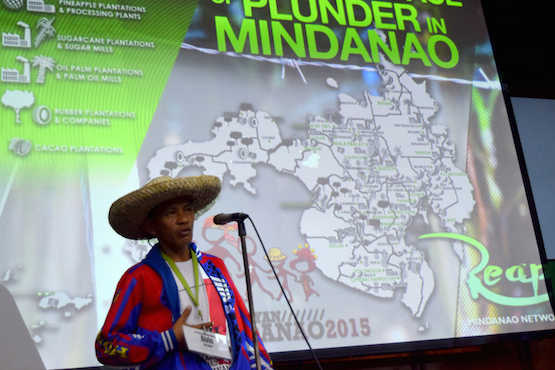
A peasant leader speaks at the launch of a network that aims to resist the expansion of agricultural plantations in Mindanao in October. (Photo courtesy of Uma)
A group of Catholic missionaries and peasant organizations in the Philippines have called for a stop to the expansion of monocropping industries in the country.
"[Monocrop industries] threaten not only the survival of small farmers and other land-based workers, it also puts into serious risk the fundamental freedoms of the people," said Sister Famita Somogod of the Rural Missionaries of the Philippines.
The missionaries joined peasant groups in Manila March 29 to observe what they called the "Day of the Landless."
The nun alleged that land grabbing by transnational companies, especially in the southern region of Mindanao, has resulted in human rights abuses.
Rafael Mariano of the Asian Peasant Coalition said the growing oil palm industry in the country threatens the livelihood of farmers and indigenous peoples.
Oil palm is cultivated in 43 countries throughout Africa, Asia, North America, and South America with about 85 percent of all palm oil being exported from Indonesia and Malaysia.
In the Philippines, the government plans to expand oil palm plantations from the current 73,000 hectares to 1.2 million hectares by 2030.
Somogod, who works as a missionary in Mindanao, said that in the southern province of Bukidnon alone, the government's land reform program is being subverted because of the expansion of big plantations.
Bukidnon is touted as Mindanao's food basket, but it is also host to the country's largest monocrop plantations. Pineapple plantations alone account for 79,501 hectares of lands while banana plantations occupy 31,607 hectares.
As of 2009, nine companies own a combined 70,129 hectares of pineapple and banana plantations in the province.
According to the Department of Agriculture, some 315,164 or 38 percent of the province's 829,378 hectares of land is alienable and disposable.
"The province has become a locus of bloody agrarian unrests in the country and the cultural impunity which exists in relation to human rights violation in agrarian situations has swelled drastically," said Somogod.
She said the struggle of peasants for land development and of tribal people for their ancestral lands have become most vulnerable to international corporate plantations.


